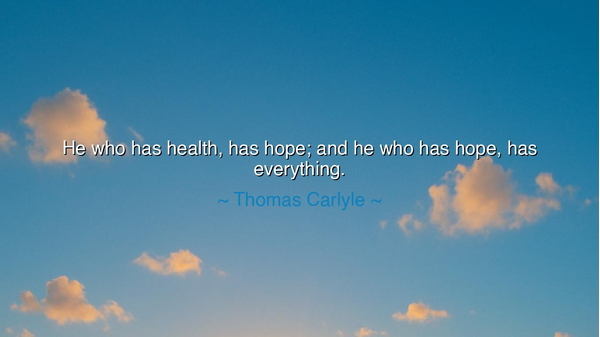
He who has health, has hope; and he who has hope, has everything.






The Scottish philosopher and essayist Thomas Carlyle, a man of fiery intellect and deep moral vision, once wrote: “He who has health, has hope; and he who has hope, has everything.” Within this simple yet profound statement lies the golden chain that binds body, spirit, and life itself. Carlyle, who lived through the storms of industrial change and personal suffering, understood the truth that vitality of the body gives birth to courage of the heart, and that courage, in turn, sustains the flame of existence. For what is life without health, and what is health without hope — that sacred force which keeps man rising, even in the shadow of despair?
To have health is to possess the foundation of all human endeavor. Without it, ambition weakens, joy fades, and even love becomes heavy to bear. Health is the quiet strength that supports every act of creation, every dream pursued, every word spoken in the service of life. Carlyle knew this well, for he himself was often plagued by illness — long nights of sleeplessness and pain. Yet even in his frailty, he saw that the body, when tended with care, is not merely flesh but the temple of the spirit. It is the vessel through which hope flows. As long as one breathes with strength, there remains the power to rebuild, to love, to begin again.
But it is hope that transforms health from mere survival into living greatness. A man in perfect health but without hope is like a strong ship without a destination — capable, yet lost. Hope gives direction to the strength of the body, purpose to the labor of the hands, and meaning to the beating of the heart. Carlyle’s words remind us that health and hope are twins, born of the same divine source: one sustains the other. When the body falters, hope revives it; when the spirit wavers, health steadies it. Together, they form the invisible foundation of all happiness and success.
History offers many witnesses to this truth. Consider Helen Keller, who was struck blind and deaf before she was two years old. Her body, deprived of two senses, could easily have become her prison. Yet her spirit burned with hope, and through that flame she found new strength. With the guidance of her teacher, Anne Sullivan, she learned to speak, to write, to live fully. She became a voice for millions who had none, proving that health is not merely the perfection of the body, but the harmony between will and possibility. In her, Carlyle’s teaching took form: because she possessed the health of the soul and the fire of hope, she possessed everything that truly matters.
Carlyle’s era was one of toil, change, and disillusionment. Factories rose where fields once bloomed; men became cogs in the wheels of industry. He watched as people lost not only their health to labor, but their hope to despair. His words were a call to remember that no machine, no wealth, no possession could replace the inner treasure of vitality and faith. To have hope is to hold a key that unlocks the door to endurance. The man who hopes can endure sickness, poverty, or loss, for within him burns the quiet certainty that the dawn will come. Thus, hope is not mere optimism — it is the courage of the heart, the refusal to surrender to darkness.
The lesson, then, is radiant and eternal: guard your health, for it is the soil from which all hope grows; and nurture your hope, for it gives life meaning even in hardship. Eat with gratitude, rest with purpose, and move with awareness. But above all, cultivate a hopeful spirit. When you fall ill, let hope heal you; when you falter, let hope lift you. For as long as hope endures, nothing is truly lost.
And so, let the words of Thomas Carlyle echo like a timeless prayer: “He who has health, has hope; and he who has hope, has everything.” The one who tends both body and soul lives beyond circumstance — rich not in gold, but in grace. Remember this, O seeker of life: hope is the breath of the heart, and health is the vessel that carries it. Keep both sacred, and you will never walk in darkness, for within you will burn the eternal light of wholeness and purpose — the light that no sickness, no sorrow, and no death can extinguish.






AAdministratorAdministrator
Welcome, honored guests. Please leave a comment, we will respond soon